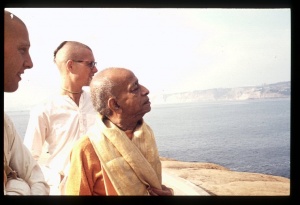CC Madhya 24.320 (1975): Difference between revisions
(Vanibot #0027: CCMirror - Mirror CC's 1996 edition to form a basis for 1975) |
(Vanibot #0020: VersionCompareLinker - added a link to the Version Compare feature) |
||
| Line 2: | Line 2: | ||
<div style="float:left">'''[[Sri Caitanya-caritamrta (1975)|Śrī Caitanya-caritāmṛta (1975)]] - [[CC Madhya (1975)|Madhya-līlā]] - [[CC Madhya 24 (1975)|Chapter 24: The Sixty-One Explanations of the Atmārāma Verse]]'''</div> | <div style="float:left">'''[[Sri Caitanya-caritamrta (1975)|Śrī Caitanya-caritāmṛta (1975)]] - [[CC Madhya (1975)|Madhya-līlā]] - [[CC Madhya 24 (1975)|Chapter 24: The Sixty-One Explanations of the Atmārāma Verse]]'''</div> | ||
<div style="float:right">[[File:Go-previous.png|link=CC Madhya 24.319 (1975)|Madhya-līlā 24.319]] '''[[CC Madhya 24.319 (1975)|Madhya-līlā 24.319]] - [[CC Madhya 24.321 (1975)|Madhya-līlā 24.321]]''' [[File:Go-next.png|link=CC Madhya 24.321 (1975)|Madhya-līlā 24.321]]</div> | <div style="float:right">[[File:Go-previous.png|link=CC Madhya 24.319 (1975)|Madhya-līlā 24.319]] '''[[CC Madhya 24.319 (1975)|Madhya-līlā 24.319]] - [[CC Madhya 24.321 (1975)|Madhya-līlā 24.321]]''' [[File:Go-next.png|link=CC Madhya 24.321 (1975)|Madhya-līlā 24.321]]</div> | ||
{{CompareVersions|CC|Madhya 24.320|CC 1975|CC 1996}} | |||
{{RandomImage}} | {{RandomImage}} | ||
==== TEXT 320 ==== | ==== TEXT 320 ==== | ||
| Line 27: | Line 26: | ||
<div class="translation"> | <div class="translation"> | ||
" 'Now that Śrī Kṛṣṇa, the Absolute Truth, the master of all mystic powers, has departed for His own abode, please tell us by whom religious principles are presently protected.' | |||
</div> | </div> | ||
| Line 34: | Line 33: | ||
<div class="purport"> | <div class="purport"> | ||
This verse from Śrīmad-Bhāgavatam ([[SB 1.1.23]]) was a question raised by all the sages, who were headed by Śaunaka. This question put before the great devotee Sūta Gosvāmī is the foremost of the six questions raised. The answer to this important question is given in the next verse | This verse from Śrīmad-Bhāgavatam ([[SB 1.1.23]]) was a question raised by all the sages, who were headed by Śaunaka. This question put before the great devotee Sūta Gosvāmī is the foremost of the six questions raised. The answer to this important question is given in the next verse from Śrīmad-Bhāgavatam ([[SB 1.3.43]]). | ||
</div> | </div> | ||
Latest revision as of 15:42, 27 January 2020

A.C. Bhaktivedanta Swami Prabhupada
TEXT 320
- brūhi yogeśvare kṛṣṇe
- brahmaṇye dharma-varmaṇi
- svāṁ kāṣṭhām adhunopete
- dharmaḥ kaṁ śaraṇaṁ gataḥ
SYNONYMS
brūhi—kindly explain; yoga-īśvare—the Supreme Personality of Godhead, the master of all mystic power; kṛṣṇe—Lord Kṛṣṇa; brahmaṇye—the protector of brahminical culture; dharma-varmaṇi—the strong arms of religious principles; svām—His own; kāṣṭhām—to the personal abode; adhunā—at present; upete—having returned; dharmaḥ—the religious principles; kam—unto what; śaraṇam—shelter; gataḥ—have gone.
TRANSLATION
" 'Now that Śrī Kṛṣṇa, the Absolute Truth, the master of all mystic powers, has departed for His own abode, please tell us by whom religious principles are presently protected.'
PURPORT
This verse from Śrīmad-Bhāgavatam (SB 1.1.23) was a question raised by all the sages, who were headed by Śaunaka. This question put before the great devotee Sūta Gosvāmī is the foremost of the six questions raised. The answer to this important question is given in the next verse from Śrīmad-Bhāgavatam (SB 1.3.43).